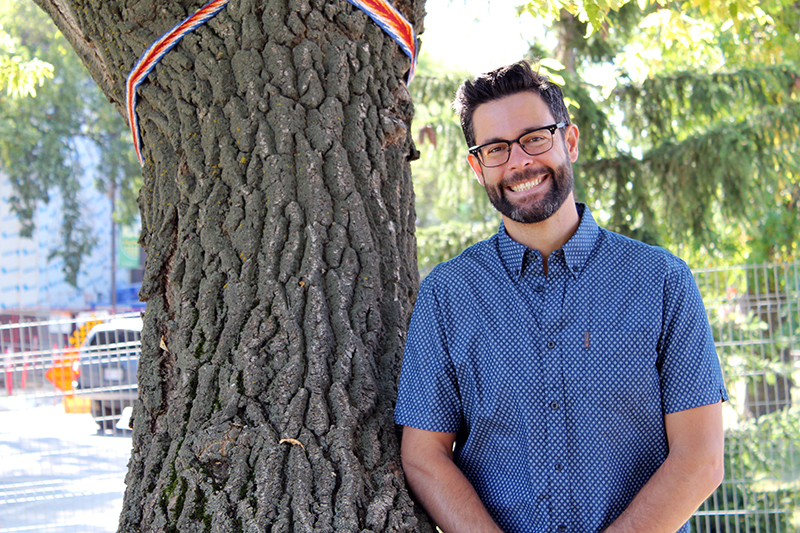
Marc Higgins with the historic tree planted by Métis leader Laurent Garneau.
Bringing together Indigenous ways of knowing and science education might seem new to the field of education, but for Marc Higgins it's been a long time coming.
As a professor in science education in the Department of Secondary Education, who is also affiliated with Aboriginal Teacher Education Program, Higgins' brings his experience as an educator from coast to coast to coast in a wide variety of contexts to his role, part of which includes introducing Indigenous knowledge systems and unpacking taken-for-granted and everyday colonial logics to teacher education.
"Bringing together Indigenous and Western views into education is not going to interest all students, but for many who have equity, social justice, or decolonizing orientations, or even caring deeply enough to change the structures that make some students' experiences in schooling negative, it will," explains Higgins.
Before coming to the University of Alberta, Higgins worked with 50 reserve and urban Aboriginal communities with Ottawa-based, national STEM education not-for-profit organization Actua. His graduate and postgraduate research focused on navigation and negotiation of Indigenous and Western modern ways-of-knowing and ways-of-being in education-- a subject that Higgins recognizes as being different from what many students have previously encountered.
"There's a need to re-open the colonial or neo-colonial structures that often make it difficult-to-impossible to hear or see Indigenous ways-of-knowing and -being in the first place," says Higgins.
"Western education is 'naturalized' and centered as the 'standard' against which other ways-of-knowing are judged. It's not that the Western standards are wrong so much as the standards are the ones that we judge others by without acknowledging where it comes from and what the effects are."
He recognizes that for some students, this isn't the easiest lesson to learn, and that it can bring up a lot of emotions and hard feelings.
"It's difficult to teach the relationship between science education and the Truth and Reconciliation Commission's 94 Calls to Action because on one hand, there's the guilt or anger that comes with recognizing that one is implicated in systems of power and oppression," explains Higgins.
"There's a lot of negative emotion that comes with that. Teaching and learning needs to be a space for a lot of complicated love."
That "complicated love" translates to being in relation with both the problematic aspects as well as the possibilities with the different worldviews, explains Higgins.
"This work isn't only about being in relation with the problematics, but it's also about being in relation to possibilities," says Higgins.
"There is so much beauty in Indigenous pedagogies and learning to be in relation in a good way with all the beings in our ecology through humility, respect, reciprocity and relationality. That's one of the reasons why I keep coming back to Indigenous scholars' work."
Still, Higgins doesn't see Western and Indigenous perspectives as being at odds with one another, so much as complimentary.
"I keep hearing that there's always room in the circle for more," says Higgins. "One doesn't need to abandon Western science in order to come-to-know Indigenous science. It's possible to have multiple, even possibly incompatible, ways-of-knowing."
Learning to merge multiple versions of knowledge was first formally introduced to Higgins during his master's degree research when he studied ways-of-knowing through movie-making in Nunavut. His supervisor encouraged him to embrace the different possibilities, which included taking a creative approach to understanding his own approach to research and research methodologies in teacher education.
"It began a journey of trying to describe, define and defend methodological and pedagogical choices, using different theories and practices to explore things", explains Higgins.
"Questions of representation, knowledge, and power are very much at play there, as well as what counts as 'Truth.' These all come to matter in how we do research, so I've been very committed to pragmatically drawing from a variety of tools, strategies, and approaches in order to decolonize educational research."
It's a lesson Higgins hopes he can pass on to students coming through the Faculty of Education.
"If anything, I want students to think methodologically and that they are able to talk about the theory, the method, the participants, the ethics and how all those things fit together and what that produces and that they are accountable to them."